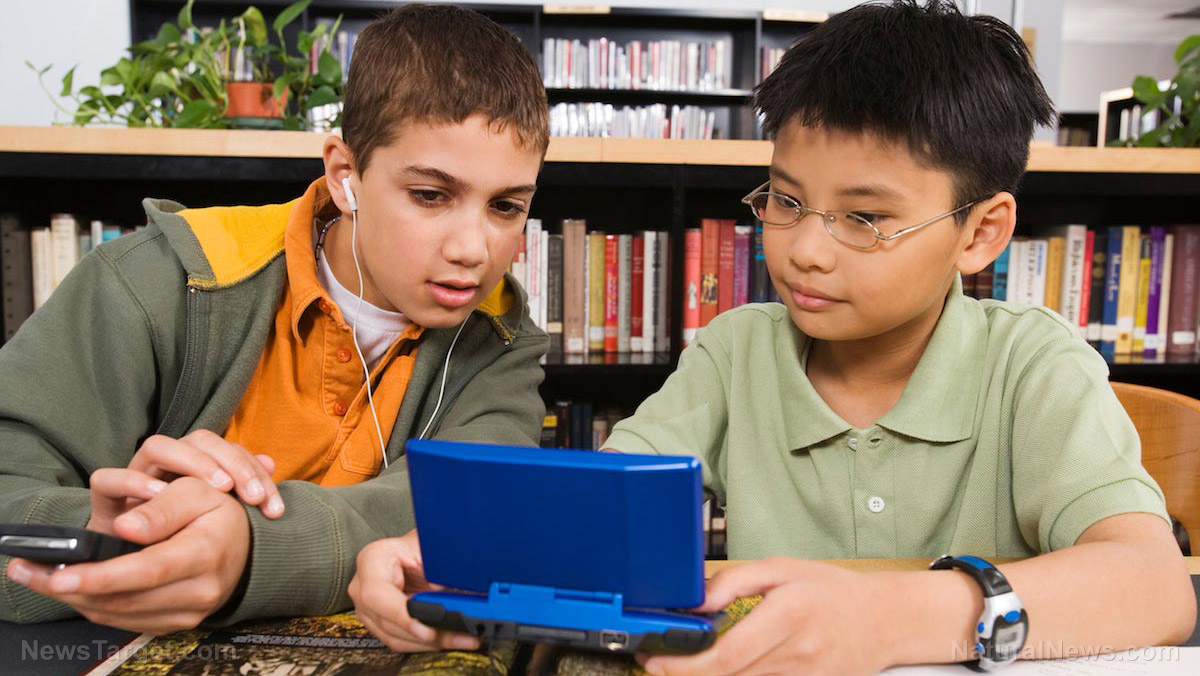Kids who spend 4 hours a day on gadgets are twice as likely to get LESS sleep
04/27/2019 / By Michelle Simmons

Are your children always sleepy? Maybe it’s time to reduce their screen time. A new study reveals that children who use their phones, tablets, or video game consoles for at least four hours a day are twice as likely to be sleep-deprived.
Researchers from San Diego State University compared the effects of wireless devices on children’s health with stationary electronic devices. To do this, they analyzed data from the 2016 National Survey of Children’s Health, which was conducted by the U.S. Census Bureau. The survey asked the caregivers of more than 40,000 healthy children aged 17 and below on how often the kids used computers, smartphones, video games, or other electronic devices on an average weekday. Answers ranged from less than an hour to more than four hours. The survey also asked the caregivers how much sleep does the child get every night. The National Health Service (NHS) in the U.K. advises five-year-old children to get 11 hours of sleep every night, while 10-year-olds and 15-year-olds should sleep for at least nine hours and 45 minutes and nine hours, respectively. Having enough sleep is important for everyone, but it is even more important for children for them to grow and develop better.
The results showed that children who spend more than four hours in front of a screen are more likely to lack sleep. Furthermore, they get lesser sleep when they use wireless electronic devices than just watching TV or using a computer. The results were the same even after the researchers adjusted for anxiety, activity levels, depression, and body mass index (BMI) among the participants.

Based on age, children below 10 years old who spent four or more hours a day looking at their phones or tablets were twice as likely to be sleep-deprived compared to those who did not use these wireless electronic devices at all. This effect was less extreme in kids who are 10 years old or older, despite them being more likely to have gadgets than younger kids. Children aged 11 to 13 who used these devices for at least four hours a day were at a 57 percent increased risk of not getting enough sleep. Those aged 14 to 17 were 44 percent more at risk of getting less sleep.
Children also often hold their gadgets closer to their faces because many gadgets have smaller screens. This is alarming because phones and tablets emit blue light, which suppresses the body’s production of melatonin or the sleep hormone. The closer a person is to the screen, the greater is its effect. (Related: Prolonged exposure to blue light from mobile phones can lead to macular degeneration.)
Based on these findings, the researchers suggest parents set a limit on their children’s use of phones and tablets. They also hope that future studies would look at the exact time of day when gadget use affects sleep the most. The American Academy of Pediatrics, the Canadian Paediatric Society, and the Australian Department of Health all advise children to limit their screen time for only two hours each day.
Other dangers of cell phones on children
One of the harmful effects of cell phone use is the risk of cancer. The World Health Organization (WHO) has classified radiation emitted by cell phones as “possibly carcinogenic to humans.” Children are also more susceptible to the radiation than adults as they absorb more than 60 percent of it into their brain, which has thinner skin, tissues, and bones. Additionally, their developing nervous system makes them more vulnerable to this carcinogen.
The radio waves from cell phones could also disturb brain activity, leading to impaired learning ability and other behavioral problems. Moreover, the use of cell phones can cause children to engage in inappropriate behaviors like watching inappropriate videos.
What should you do? It is best to limit your kids’ exposure to radiofrequency wireless devices. Limit their use of cell phones as a toy and when your kids use it to play games, set it on airplane mode. In addition, turn off all gadgets at least 30 minutes before bedtime.
Sources include:
Submit a correction >>
Tagged Under:
badtech, blue light, Cell Phone Dangers, cell phone radiation, cell phones, children's health, dangerous tech, electronic devices, electronics, eye damage, eye health, eyes, gadgets, Glitch, mental health, mobile phones, radiation, research, sleep, sleep deprivation, sleep disorders, Smartphones, tablets, technology
This article may contain statements that reflect the opinion of the author





















